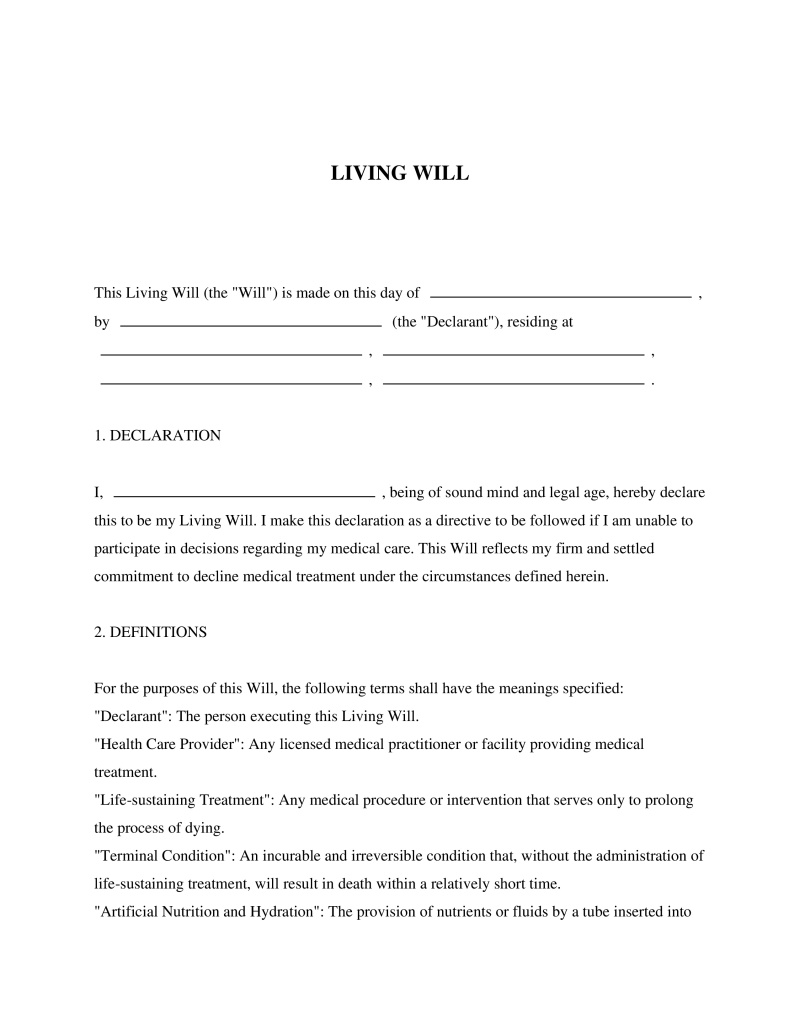What is a Living Will?
A Living Will, often referred to as an advance medical directive or healthcare directive, is a legal document that outlines a person’s wishes regarding their medical care if they become unable to communicate their decisions due to illness or incapacity. It provides clear guidance to healthcare professionals and loved ones about your preferred treatment options, helping to avoid potential disputes or confusion. Key features of a Living Will include:
- Specifies medical treatments you would or wouldn't want to be used to keep you alive
- Details your preferences for pain management and comfort care
- May appoint a healthcare proxy or surrogate to make decisions on your behalf
- Offers peace of mind knowing your medical care wishes will be respected
Scenarios That Call for a Living Will
A Living Will becomes necessary when you want to ensure your medical treatment preferences are followed when you're unable to make or communicate your own decisions. This could occur due to severe physical injuries, mental health issues, or terminal illnesses. Here are a few examples:
- Individuals diagnosed with progressive diseases such as Alzheimer's or Parkinson's
- People undergoing high-risk surgeries
- Elderly individuals who want to avoid unnecessary and unwanted medical procedures
Ideal Users of a Living Will
While a Living Will is typically associated with seniors, it is a useful document for any adult, regardless of age or health status. It is particularly beneficial for:
- People with definitive healthcare preferences
- Individuals with chronic illnesses
- Those who have strongly held beliefs about end-of-life care
Key Legal Benefits of a Living Will
A Living Will is more than just a statement of your medical preferences, it’s a legally binding document that ensures your healthcare decisions are respected. It provides:
- Legal protection of your healthcare wishes
- Guidance to medical professionals and family members
- Reduction of potential disputes among family members
Living Will vs Advance Directive
It's important to understand the difference between a Living Will and an Advance Directive as these terms are often used interchangeably. A Living Will is a type of Advance Directive, focused on end-of-life care. There are other types of Advance Directives, such as a durable power of attorney for healthcare, which assigns a specific person to make healthcare decisions on your behalf.
How to Create a Living Will
Creating a Living Will involves several steps:
- Determine which medical treatments you do or don't want
- Identify a healthcare proxy if desired
- Use a Living Will template or consult with a legal professional for guidance
- Sign the document in the presence of required witnesses or a notary public
- Share copies with your healthcare proxy, family members and healthcare providers
FAQs
About this document
A Living Will is a legal document that allows individuals to specify their medical treatment preferences in case of incapacitation, ensuring their healthcare decisions are respected and legally upheld across all U.S. states.
This document utilizes our advanced PassTheBar AI technology, ensuring bar-exam precision and comprehensive legal coverage.
This document is designed to comply with the laws of all 50 states.
Community Discussion
Share your experience and help others
Legal Notice: Comments are personal opinions and do not constitute legal advice. Always consult a qualified attorney for matters specific to your situation.

Comments (0)
Leave a Comment
No comments yet. Be the first to comment!